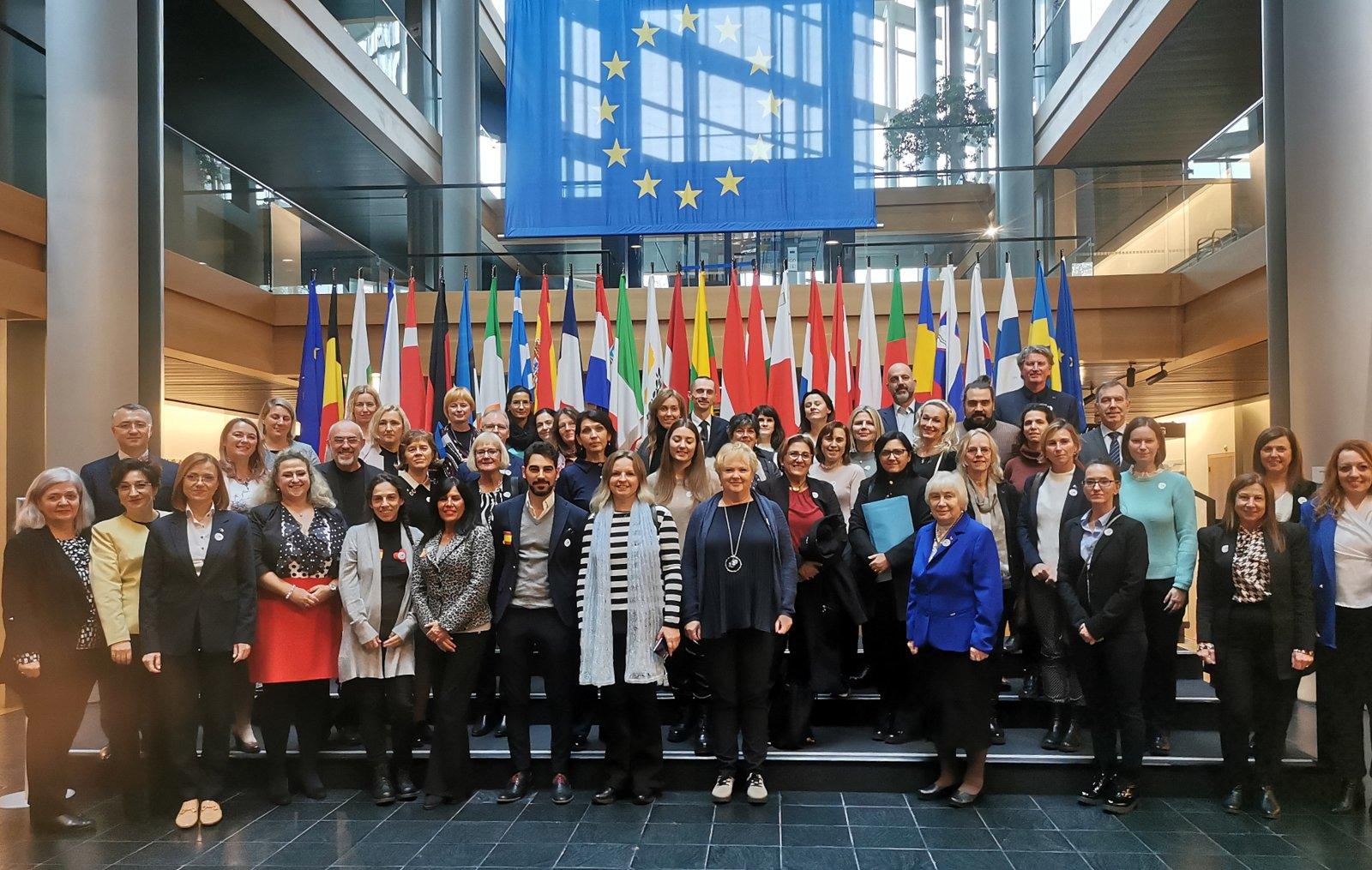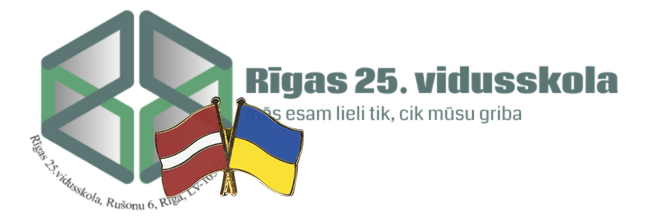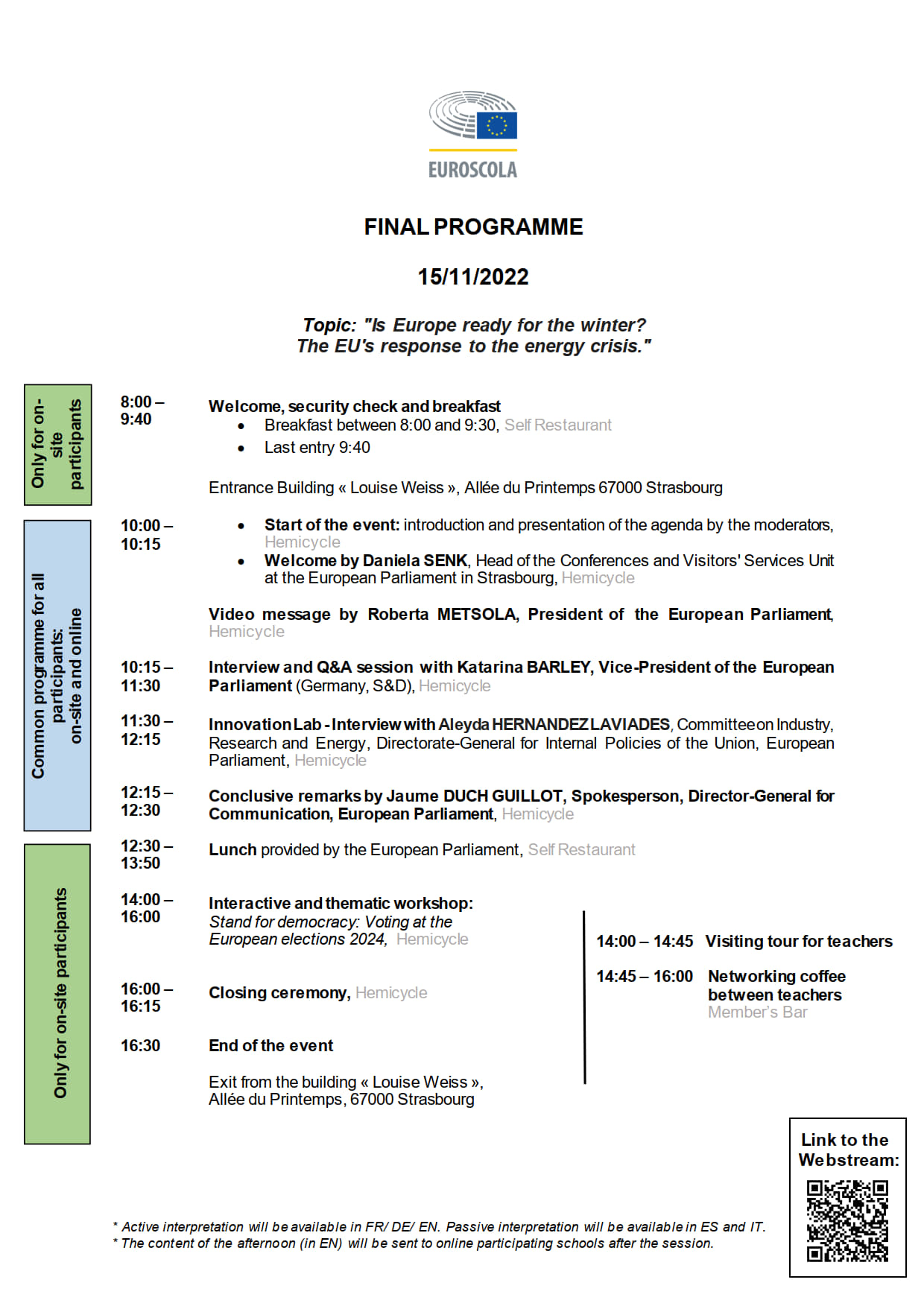EUROSCOLA
2022
Piedalās
EUROSCOLA
EUROSCOLA HYBRID
WHERE: AT THE EUROPEAN PARLIAMENT IN STRASBOURG
WHEN: 15 NOVEMBER 2022
TIME: 10H00 – 16H30
ONLINE PLATFORM: INTERACTIO
TOPIC: "IS EUROPE READY FOR THE WINTER?”
THE EU’S RESPONSE TO THE ENERGY CRISIS

SUMMARY
EUROSCOLA: PROGRAMME AND PERSPECTIVE
After a video message of the president of the European
Parliament, Roberta Metsola, welcoming the participants, students of this
edition of Euroscola Hybrid will have the opportunity to talk with a Member of
the European Parliament, Mrs. Katarina Barley, VicePresident of the European
Parliament, (S&D, Germany) about the topics that interest and concern
them.
Moreover, the topic of the day will focus on the energy
crisis in Europe, which will be examined from its most relevant angles for
young people. In the Innovation Lab, students will have the possibility to
interview Ms. Aleyda Hernandez Laviades, Administrator in the Committee on
Industry, Research and Energy at the DG for Internal Policies at the Union, on
the European Union’s response to the crisis. In the afternoon, participants who
are present on site will take part in a Q&A Workshop on our principle
democratic values; a special focus will be dedicated to youth’s opportunity to
vote for the first time at the next European elections 2024. Teachers will take
part in a guided tour of the European Parliament, followed by a crucial
networking moment with their colleagues from the participating countries.
Euroscola’s main objective is to build long-term
relationships, reinforce our European spirit and community, and strengthen our
common European identity.
The energy crisis in Europe
With the Russian invasion of Ukraine, Russia has stopped
delivering natural gas to most of Europe in order to press the European Union
to reduce its support for Ukraine. Europe, who imported almost 40% of its gas
from Russia, has since witnessed an enormous increase in gas and energy prices,
which are now some ten times their average level over the last decade. Some
individual member states have since been trying to offer financial relief to
their citizens and businesses, others have been considering to keep coal-fired
power plants and to delay closures of nuclear energy generators. However, the
European Union urged the member states to work together to better mitigate the
impact of the crisis and reduce risks. The EU has proposed three EU-coordinated
measures to cut down energy bills: Reducing electricity use, capping revenues of
electricity producers and securing a solidarity contribution from fossil fuel
businesses. On a long-term scale, the EU has moreover made plans to improve
energy efficiency and to diversify the EU’s energy supplies.
The EU and its member states stand united in their
unwavering support for Ukraine and firmly condemn Russia’s unprovoked and
unjustified military aggression. To this end, the EU has provided Ukraine with
humanitarian, political, financial and military support. In response to the
military aggression, the EU has adopted a significant number of sanctions and
unprecedented measures against Russia. The eight packages of sanctions that the
EU has adopted since the 23rd of February 2022 range from individual targeted
sanctions to restrictions on access to the EU’s market and or economic
sanctions covering the finance, energy transport and technology sector.
Furthermore, the EU has provided support to the refugees fleeing the war in
Ukraine and the countries hosting them.
CONCLUSION
The main goal of Euroscola is to strengthen a European identity, to inform young people about their rights as EU citizens and to encourage them to make use of them, as well as to inspire those young people to become engaged in the future of Europe. The responsible unit at the headquarters of the European Parliament cares about developing the educational work of Euroscola.
Finally, Euroscola aims to establish a link between the European Union and its young citizens. The event will offer them a unique opportunity to discuss challenges of the future with
European decision-makers and personalities who can be a source of inspiration for them. Thus, the event will give them the opportunity to make their voices heard and discuss innovative solutions for the future of Europe. Students can continue their engagement with Europe by registering on the platform and participating in events: https://together.europarl.europa.eu
The next European elections will take place in spring 2024, a crucial opportunity for youth to help shape their future in Europe.
Stay tuned and join us on our social networks:  @Euroscola
@Euroscola
WEB REFERENCES
Profile of Vice-President Katarina Barley on Europarl.eu:
https://www.europarl.europa.eu/meps/lv/197433/KATARINA_BARLEY/home
Euroscola : https://youth.europarl.europa.eu/lv/more-information/euroscola.html
European Youth Portal: https://youth.europa.eu/home_lv
Ensemble.eu: https://together.europarl.europa.eu/lv/
Europass: https://europa.eu/europass/lv
European Council of the European Union: https://www.consilium.europa.eu/lv/
Youth Hub: https://youth.europarl.europa.eu/lv/more-information/euroscola.html
European Commission: https://eu-solidarity-ukraine.ec.europa.eu/index_lv
European Parliament Press room: https://www.europarl.europa.eu/news/lv/press-room
European Parliament Think Tank: https://www.europarl.europa.eu/thinktank/lv/home
EUROSCOLA
EUROSCOLAS nedēļa

EUROSCOLA 2022.15.11.
RĪGAS 25.VIDUSSKOLAS EPVS
atsauksmes par braucienu uz Eiropas Parlamentu Strasbūrā
- Atmosfēra seansu laikā bija ļoti patīkama, jo bija pilna piederības sajūta pateicoties iespējai katram balsot un piedalīties diskusijā. Protams, dodoties braucienā ļoti patika jaukais kolektīvs, ko nevar nepieminēt, jo tas ietekmē atmiņas no darba parlamentā. Ārvalds Mukāns
- Ļoti interesants un ar piedzīvojumiem pilns brauciens. Ceļš bija garš, bet nebija garlaicīgs, jo bija jauks un pozitīvs kolektīvs. Eiropas Parlamentā ieguvu lielu pieredzi un izjutu uz savas ādas kā ir sēdēt, klausīties un spriest par turpmāk notiekošo.
- Man personīgi ļoti patika strādāt Strasbūrā. Varēja iegūt jaunu informāciju un dalīties ar savām domām ar citiem jauniešiem. Mūsu draudzīgā komanda deva labu vidi, kurā varēja labi justies un strādāt.
- Darbs parlamentā bija lieliska iespēja mūsu grupai izpausties uzskatos un zināšanās par pasaulē aktuālajām tēmām. Tas deva iespaidu un izpratni par Eiropas Parlamentu un tā kārtību.
- Man šī pieredze, darbojoties Strasbūrā un Eiropas Parlamentā, noderēs nākotnē. Esmu ļoti pateicīgs komandai, kurā mani pieņēma, uzklausīja manu viedokli. Bija viegli sadarboties ar maniem vienaudžiem.
- Pieredze Strasbūrā deva plašāku redzesloku, jaunu iedvesmu un drosmi augt un attīstīties tālāk! Bija patiesi iedvesmojoši būt vidē, kurā sapulcējušies jaunieši no dažādām Eiropas Savienības valstīm ar atšķirīgām kultūrām. Vidē, kur katram ir iespēja izteikties par nozīmīgām tēmām visā Eiropas Savienībā un būt uzklausītam. Pēc dalības "Euroscola" jūtos kā būtu pabijusi Eiropas Parlamenta sirdī, kur visi tiek uzklausīti un iedvesmoti! Elīza Beloglazova
- Man bija liels prieks būt starp tiem dažiem skolēniem no Latvijas, kuri tika uz Eiropas Parlamentu, jo tur es guvu lielu pieredzi, daudz draugus un labas atmiņas. Man vēderā lidoja taurenīši, zinot to, ka man tika dota iespēja pārstāvēt Latviju Eiropas Parlamentā, un bija liels prieks zinot to, ka pateicoties mums EP Latviju noteikti atcerēsies - labā ziņā, protams.
- Eiropas Parlamentā mēs diskutējām par aktuālām tēmām. Bija ļoti liela interese parunāt un iepazīties ar citām valstīm. Un protams, ieguvām jaunus un foršus draugus no Latvijas.
- Kopumā šis jauniešu pasākums un diskusijas bija iespaidīgas, pārstāvēt savu valsti starptautiskā diskusijā par aktuālām problēmām jauniešiem ir pieredze, kas dod neaprakstāmu drosmi uzdrīkstēties un runāt. "Tie esam mēs, kas veido nākotni" šāda sajūta mani pavadīja visu dienu Parlamentā un braucienā.
- Brauciens uz Strasbūru man pavēra plašāku skatu par to, ka jauniešu aktīvisms aktuālās tēmās nebeidzas tikai Latvijas robežās.



